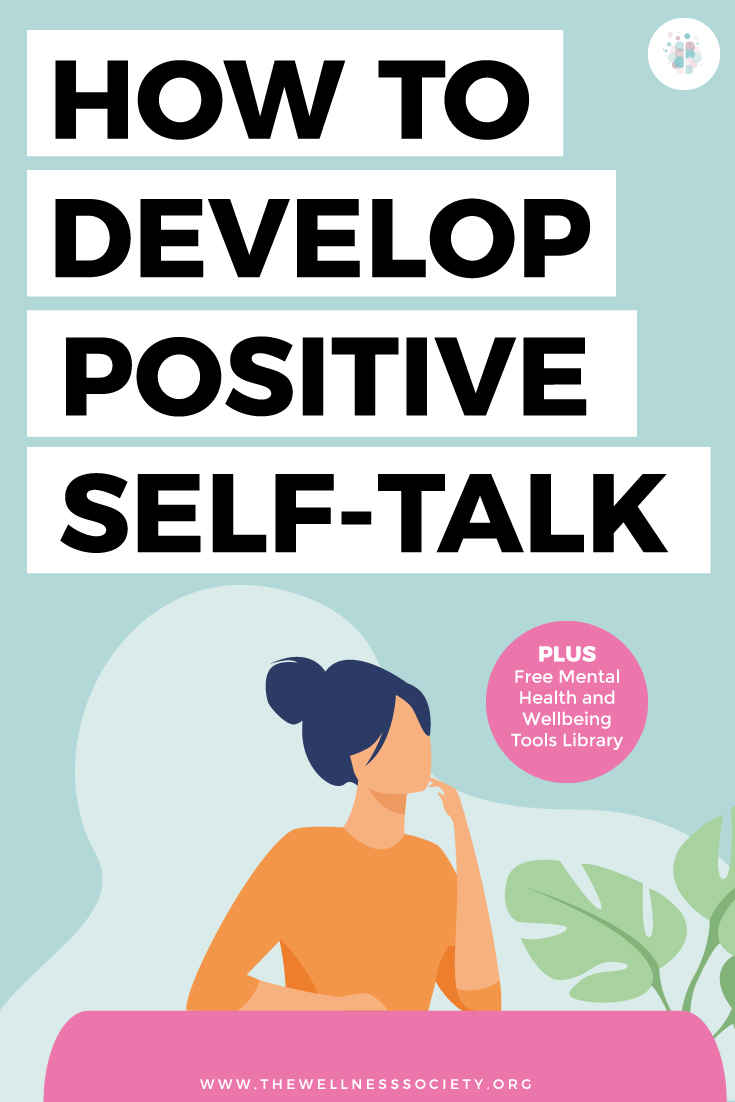“Most people don’t realize that the mind constantly chatters. And yet, that chatter winds up being the force that drives us much of the day in terms of what we do, what we react to, and how we feel.” – Jon Kabat-Zinn
What Is Self-Talk?
Self-talk is the internal dialogue or narrative that we hold about ourselves. It's the inner chatter that encompasses all the things that you say to and about yourself.
Even though you might not be aware of it all the time, your self-talk has a significant impact on the way you perceive yourself, the people around you, and the world in general.
Negative vs Positive Self-Talk
Developing positive self-talk isn’t easy, and many people struggle when they first embark on this element of their personal development journey.
You see, our brains have a solid negativity bias. Our attention and memory are automatically focused on negative things much more often than neutral or positive ones.
We’re also hardwired to remember negative experiences and to focus on the negative things that we don’t like about ourselves, in contrast to the positive ones. The thoughts “I’m not good enough”, “I can’t do anything right”, and “I’m a failure” come to mind much easier than anything kind about ourselves.
We’re wired to go back to the past and remember all the times we made mistakes or behaved in ways we don't like.
The good news is developing positive self-talk gets easier with practice. It’s important to note that when you use positive self-talk, you’re not lying or deceiving yourself. You’re not denying reality, and you’re not just complimenting and flattering yourself without any basis for it.
Instead, you reframe how you perceive things and you keep your negativity bias under control.
You show yourself self-compassion and understanding for who you are, what you’ve been through, and what you’re facing right now. You remind yourself that you’re a life-long learner, and that you’re still working on developing your skills and abilities.
Benefits of Positive Self-Talk
Positive self-talk and self-compassion act as a buffer between negative life events and our emotional functioning in general.
The use of this strategy is associated with multiple benefits:
- Enhanced performance at work and in daily activities
- Increased ability to cope with challenges, change and uncertainty
- Reduced stress and pain levels
- Increased problem-solving skills
- More stable and deeper social relationships
Three Ways to Develop Positive Self-Talk
1. Use The Friend Response
Do you sometimes feel that you’re your own worst critic and that you put yourself down? Are you too harsh, authoritative, or even mean when you speak to yourself? Some of the negative things we tell ourselves in our inner dialogues, we'd never say to a loved one, to a stranger or even to a perceived competitor or enemy.
If you wouldn’t say it to a loved one, do not say it to yourself!
Why are we protecting the ones around us and are willing to put so much care and effort into how we talk to them, but we're not willing to do the same for ourselves? Do we not deserve the same level of care and effort?
Yes, yes, we do! We just need to be reminded of it. And this is what positive self-talk and self-compassion are all about. When you catch yourself saying negative and even cruel things about yourself, stop and ask: Would I talk like that to my friends? If the answer is no, then you need to respond with a more compassionate and understanding sentence.
2. Use Positive Affirmations for Developing Positive Self-Talk
In addition to practicing the Friend Response technique, incorporating positive affirmations into your daily routine can be a powerful way to develop positive self-talk. Positive affirmations are short, uplifting statements that are designed to counteract negative or self-critical thoughts. They serve as a reminder of your self-worth and can help you build a more compassionate and encouraging inner dialogue. Here's how you can use positive affirmations to boost your self-talk:
- Identify your affirmations. Start by identifying areas of your life where you tend to be self-critical or where you'd like to foster more positive self-talk. This could be related to your self-esteem, body image, career goals, or personal relationships.
- Create affirmations. Once you've identified these areas, create positive affirmations that directly address them. For example, if you struggle with self-esteem, your affirmation might be: "I am confident and worthy of love and respect."
- Repeat your affirmations. Incorporate your chosen affirmations into your daily routine. You can say them out loud in front of a mirror, write them in a journal, or place sticky notes with your affirmations in places where you'll see them frequently. The key is to repeat these affirmations consistently. Be sure to check out our article with 29 positive affirmations which also includes free mobile wallpapers.
- Challenge negative thoughts. When you catch yourself engaging in negative self-talk, use your affirmations as a countermeasure. Replace self-criticism with your positive affirmations. For example, if you find yourself thinking, "I'm not good enough," remind yourself, "I am enough, and I'm continually growing and improving."
- Believe in your affirmations. It's essential to genuinely believe in the affirmations you use. To enhance their effectiveness, try to connect with the meaning and truth behind each statement. Over time, as you witness the positive impact of these affirmations on your self-talk, your belief in them will grow.
Using positive affirmations can help you gradually replace self-criticism with self-compassion and positivity.
3. Become Aware of Labelling
Am I really unlovable just because someone didn’t want to be in a relationship with me?
Am I really stupid just because I didn’t manage to understand something in that situation?
Am I really incapable just because I made a mistake?
No, no, no!
In cognitive-behavioral therapy (CBT), the above examples are understood as a type of cognitive distortion called labelling.
Labelling is when we make sweeping judgments and generalizations that are overly simplistic and inaccurate.
When engaging in labelling, we use extreme and rigid labels to define ourselves or others. These labels ignore the complexity of human behavior and can lead to lower self-esteem, strained relationships, and missed opportunities for growth and understanding.
When we say we're incapable or unlovable, that means that we see ourselves only through those lenses, and it comes with a sense of permanency – if I'm incapable, I will not believe I'll be capable of completing a similar task tomorrow or the next day. Even if you're unable to do something right now, that doesn’t mean you can’t do it in general, and that you can’t try again later or tomorrow.
Instead of labelling yourself, focus on developing a constructive, supportive and motivating inner dialogue. Why did you make a mistake? Maybe you weren’t paying attention, you didn’t have all the information you needed, or you were running low on energy and resources. What can you do to minimize the impact of these factors in future?
If what you’re saying to yourself does not bring you any value and does not positively motivate you to improve your behaviors or skills, then all you’re doing is submitting yourself to mental suffering.
Try talking to yourself in a calm but clear and reassuring way, avoiding all unkind labels.
Labelling can be challenged and replaced with more realistic and balanced thinking through CBT techniques. This involves examining the evidence supporting the label, considering alternative explanations, and developing a more nuanced and compassionate understanding of oneself and others.
In addition, Buddhist philosophy can help you shift your mindset and engage in less labelling.
Non-duality, a central principle in Buddhism, challenges the division of phenomena into opposing categories like good versus bad, right versus wrong, or self versus other.
It’s a philosophical standpoint that acknowledges the complexity and interconnectedness of all things, moving beyond the limitations of labels and conceptual boundaries that we often impose on our perception of reality.
It emphasizes that these divisions are constructs of the mind and do not truly reflect the ultimate nature of existence. By transcending dualistic thinking, we can cultivate a more comprehensive understanding of the world.
Summary
Developing positive self-talk is difficult but important for your wellbeing.
It’s often misunderstood – it’s not about giving yourself excessive praise and compliments. It’s about training your mind to overcome its inherent negativity bias and distorted thinking. Respond to your inner critic by asking yourself how you’d speak to a friend. Practice noticing how your mind engages in labelling, and focus on being constructive, supportive and motivating with yourself.
Take Control of Your Mind With Self-Help Tools
Want practical tools to help you develop positive self-talk?
Our self-guided program includes tools from CBT, DBT, ACT and more, so you can discover what works best for you. Check out The Mental Wellbeing Toolkit today – it's "like 10 therapy sessions in one."

About Roxana
Roxana Petrus is a psychologist and an emotional health specialist with a background in cognitive-behavioral psychotherapy. She currently supports amazing women in finding their emotional balance and improving their communication skills. She is located in Basel, Switzerland and works mostly online, offering individual sessions, different programs and workshops.Website
Email: coaching@roxana-cristina.com
Pin For Later


